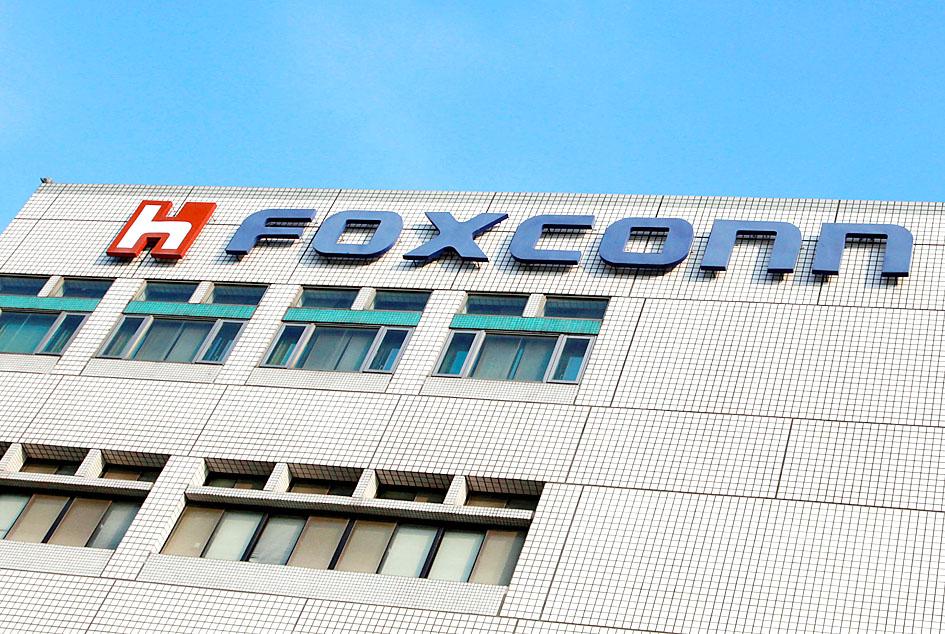Hon Hai Precision Industry Co (鴻海精密) yesterday posted a smaller-than-expected monthly revenue decline of 4.13 percent for last month as China’s COVID-19 restrictions did not exert heavy pressure on the iPhone maker’s production.
Revenue last month fell to NT$486.5 billion (US$16.49 billion) from NT$507.4 billion in March, supported by a double-digit percentage growth in its cloud-based and networking products business, Hon Hai said in a statement.
Last month’s result was the second-strongest April revenue in the company’s history after it posted NT$500.49 billion in April last year, meaning revenue shrank 2.8 percent year-on-year.

Photo: Nicky Loh, Reuters
In the first four months of this year, Hon Hai’s revenue rose 2.76 percent to NT$1.89 trillion from NT$1.84 trillion in the same period last year, the highest for the four-month period in the company’s history, it said.
Hon Hai attributed a double-digit percentage expansion in its cloud-based networking business to robust growth during the January-April period.
Computing products and components, and other products also delivered significant growth, it said.
Hon Hai said that the COVID-19 pandemic “caused different impacts on supply chains.”
“However, our current visibility for the second quarter is still roughly in line with market expectation,” it said.
“Given that the pandemic situation is changing rapidly, coupled with swing factors such as the geopolitical situation and inflation, we need to closely monitor the impact of supply chain changes on market supply and demand,” it said.
Hon Hai, also known as Foxconn Technology Group (富士康科技集團), said that production was not affected by China’s COVID-19 restrictions, as its Shenzhen and Zhengzhou factories are allowed to operate normally under a closed-loop scheme, with employees living and working on company campuses.
However, TF International Securities (天風國際證券) analyst Kuo Ming-chi (郭明錤) wrote on Twitter that “June-August is critical for ramping new iPhone production. If COVID-19 related movement curbs aren’t removed before June, Foxconn’s Zhengzhou iPhone production capacity, likely including iPhone 14, may still be affected by logistics and workforce allocations.”
Hon Hai is scheduled to release detailed financial figures for last quarter and update its business outlook during a quarterly investor conference on Thursday next week.

Intel Corp chief executive officer Lip-Bu Tan (陳立武) is expected to meet with Taiwanese suppliers next month in conjunction with the opening of the Computex Taipei trade show, supply chain sources said on Monday. The visit, the first for Tan to Taiwan since assuming his new post last month, would be aimed at enhancing Intel’s ties with suppliers in Taiwan as he attempts to help turn around the struggling US chipmaker, the sources said. Tan is to hold a banquet to celebrate Intel’s 40-year presence in Taiwan before Computex opens on May 20 and invite dozens of Taiwanese suppliers to exchange views

Application-specific integrated circuit designer Faraday Technology Corp (智原) yesterday said that although revenue this quarter would decline 30 percent from last quarter, it retained its full-year forecast of revenue growth of 100 percent. The company attributed the quarterly drop to a slowdown in customers’ production of chips using Faraday’s advanced packaging technology. The company is still confident about its revenue growth this year, given its strong “design-win” — or the projects it won to help customers design their chips, Faraday president Steve Wang (王國雍) told an online earnings conference. “The design-win this year is better than we expected. We believe we will win

Quanta Computer Inc (廣達) chairman Barry Lam (林百里) is expected to share his views about the artificial intelligence (AI) industry’s prospects during his speech at the company’s 37th anniversary ceremony, as AI servers have become a new growth engine for the equipment manufacturing service provider. Lam’s speech is much anticipated, as Quanta has risen as one of the world’s major AI server suppliers. The company reported a 30 percent year-on-year growth in consolidated revenue to NT$1.41 trillion (US$43.35 billion) last year, thanks to fast-growing demand for servers, especially those with AI capabilities. The company told investors in November last year that

Power supply and electronic components maker Delta Electronics Inc (台達電) yesterday said it plans to ship its new 1 megawatt charging systems for electric trucks and buses in the first half of next year at the earliest. The new charging piles, which deliver up to 1 megawatt of charging power, are designed for heavy-duty electric vehicles, and support a maximum current of 1,500 amperes and output of 1,250 volts, Delta said in a news release. “If everything goes smoothly, we could begin shipping those new charging systems as early as in the first half of next year,” a company official said. The new